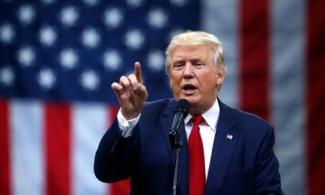
Those punishments can include limiting the number of people, who can travel to the U.S. from any one country, requiring foreign travelers to post "admission bonds" that would be repaid once they leave the country and requesting more documents from foreigners seeking visas.
President of the United States, Donald Trump, has ordered the secretaries of State and Homeland Security to develop plans to crack down on countries whose citizens are most likely to overstay their visas, a long-term problem that is now the biggest driver of illegal immigration into the United States, according to USA Today News.
In 2018, more than 569,000 foreigners overstayed their visas, according to Homeland Security data.
In an effort to slow that trend, Trump ordered Secretary of State, Mike Pompeo, and Acting Homeland Security Secretary, Kevin McAleenan, to implement a broad series of punishments for countries whose citizens overstay their tourist and business visas more than 10 per cent of the time.

Those punishments can include limiting the number of people, who can travel to the U.S. from any one country, requiring foreign travelers to post "admission bonds" that would be repaid once they leave the country and requesting more documents from foreigners seeking visas.
Under the guidelines set out by Trump, 21 countries could face sanctions because 35,442 of their citizens overstayed their U.S. visas in 2018, according to Homeland Security data.
The region facing the most potential impact is Africa, home to 13 countries on the list ranging from Angola to Chad to Sudan.
The biggest target by far is Nigeria, which saw 29,004 of its citizens overstay their visas in 2018.
The President could have chosen to punish countries where the largest numbers of total visa overstays came from.
[story_link align="left"]85218[/story_link]
For example, more than 34,000 Brazilians, 15,000 Chinese, 10,000 Indians and 10,000 French overstayed their visas in 2018.
But Trump chose to target countries where the overstay rate — not the total number of people, who overstayed their visas — was high.
That means Brazil, China, India and France will not be affected by Trump's order since their citizens' combined overstay rate was 0.9 per cent.
But smaller countries like Bhutan, a mountainous nation squeezed between China and India, could face sanctions since 46 of 398 of its people, who travelled to the U.S. in 2018 overstayed their visas, a rate of 13.1 per cent.
Critics say it's no coincidence that the Trump administration chose a method that punishes mostly African and Asian countries and spares European countries and other U.S. allies.
"This is Stephen Miller's way of operationalising his immigration strategy to 'make America White again' by covering his tracks with data to disguise the underlying White nationalist objectives of the policy," said Douglas Rivlin, Director of Communications for America’s Voice, an immigration advocacy group, of the President's immigration adviser.
In 2018, of the 1,840,482 foreigners, who entered the country on those visas, 2.1 per cent stayed past their expiration date.
In the same year, of the 15,257,468 foreigners, who entered the country on business or tourist visas, 1.9 per cent overstayed.
Here's the full list of countries whose citizens overstay their U.S. tourist and business visas more than 10 per cent of the time in 2018: Afghanistan, Angola, Bhutan, Burundi, Cabo Verde, Chad, Republic of the Congo, Djibouti, Eritrea, Georgia, Laos, Liberia, Mauritania, Federated States of Micronesia, Nigeria, Palau, Somalia, South Sudan, Sudan, Syria and Yemen.